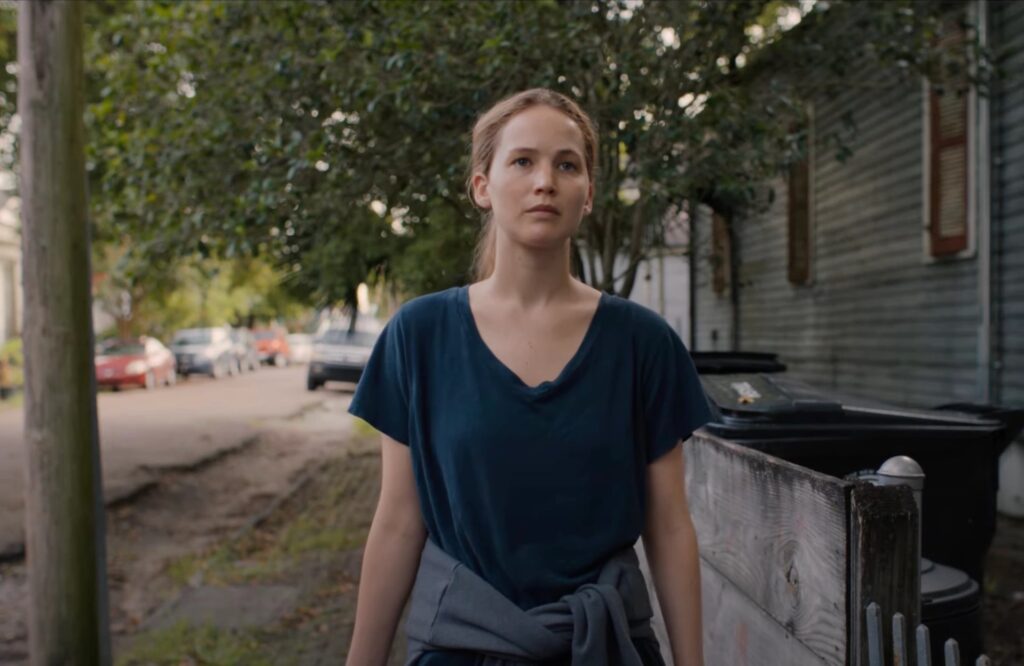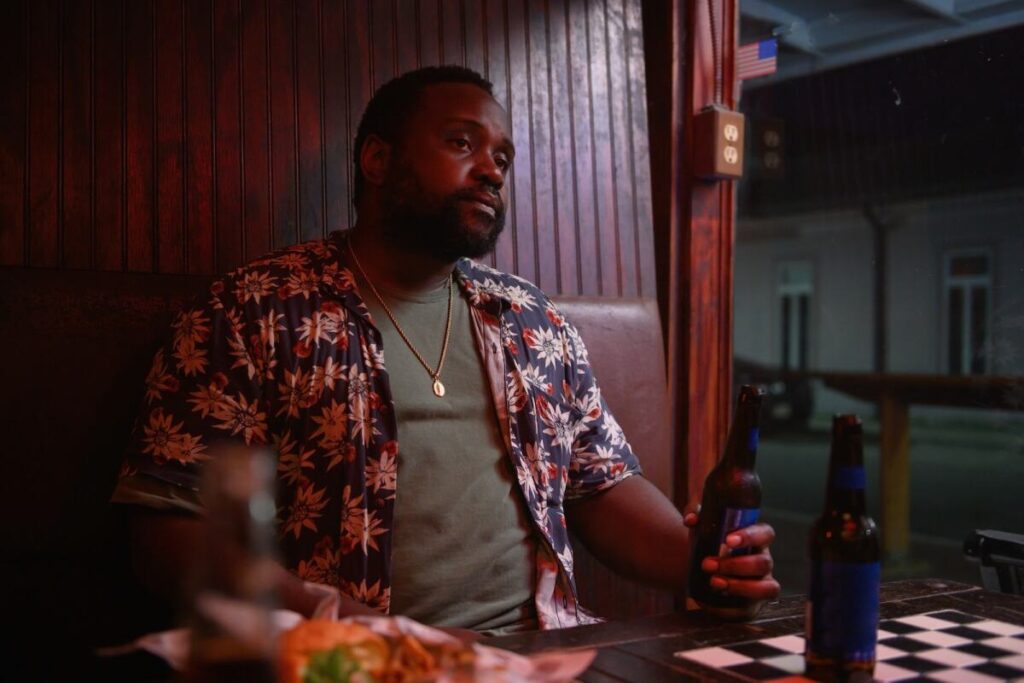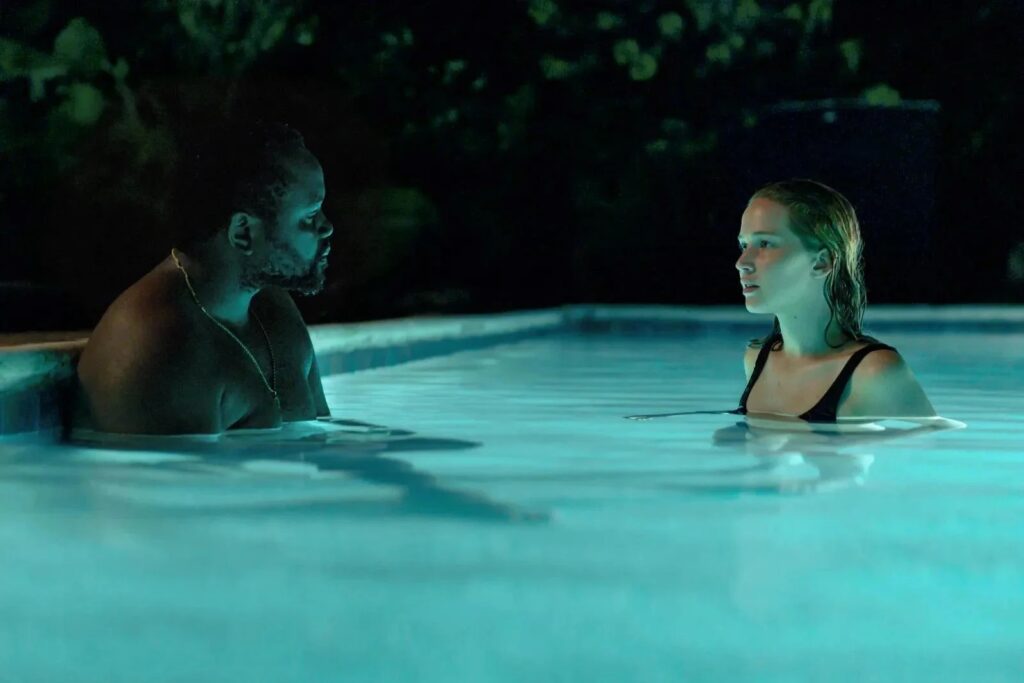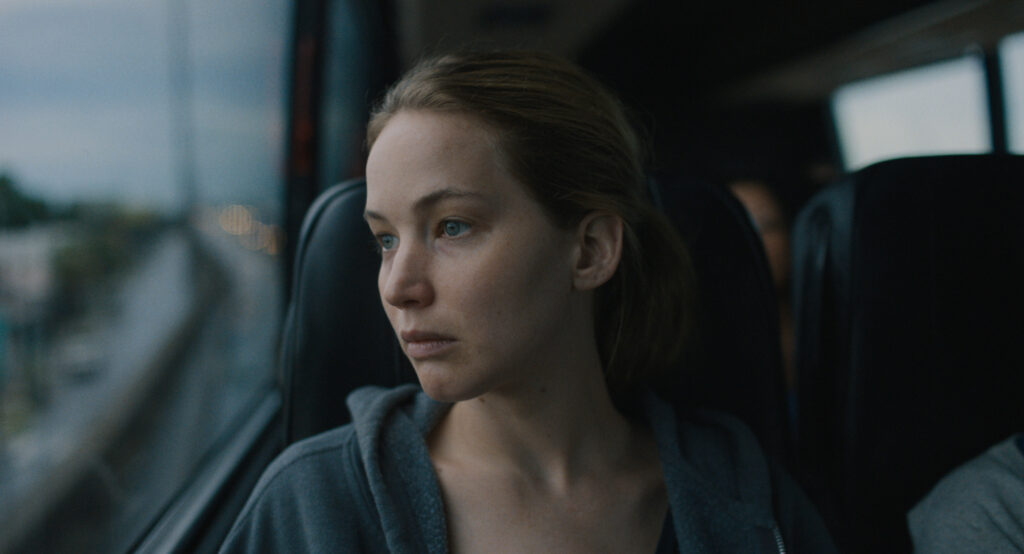Directed by Lila Neugebauer, Causeway stars Academy Award-winning actress Jennifer Lawrence as Lynsey, a military engineer who has returned home from Afghanistan with a debilitating brain injury. After a slow and painful recovery where she relearns to walk and regains her memory, she returns to her childhood home in New Orleans. Staying with her mother (Linda Emond), Lynsey struggles to return to some form of normality as she waits for her eventual redeployment.
She soon meets James Aucoin (Brian Tyree Henry), and the two start to rely on each other for company and solace. These two damaged souls’ budding friendship form the heart of Neugebauer’s debut feature, an understated and profound story about coming to terms and moving forward.
Ahead of Causeway ‘s release, Outtake sat down with director Lila Neugebauer and with producer Justine Ciarrocchi – co-founder of the Excellent Cadaver production banner with Jennifer Lawrence – to discuss the project, manifestations of trauma, and finding peace in the present.

What attracted you to this project, and what were your initial reactions to the script?
Justine Ciarrocchi: This script was submitted to us towards the end of Jen’s hiatus, when she was starting to consider going back to work. I think she had done a slew of bigger studio films and was itching to do something more intimate, like more of a character piece. I also think that so much of what was coming to us was very traditionally structured. So, this was a gift – you could feel the soul on the page. because oh my gosh, I mean, you could feel the soul on the page. It was untraditional, it wasn’t particularly plot-forward and just was super refreshing. And when Jen met Lila, it became super clear that this was the one to return to work for.
Lila Neugebauer: I’ve primarily been a theatre director and, about three years ago, I was sent the script for this film. At the time, I had been doing a little bit of television work and had just begun saying out loud that I was interested in making features – it’s something I’d always wanted but hadn’t said aloud. But I read the original draft of this script and was disarmed by how immediately connected I felt to this character’s inner life, and how very taken I was with the material.
Then, not long after I read it, I heard that Jen had a similar response. I was asked whether I would like to have dinner with her, and of course, I said yes. As Justine described, my experience was quite similar in that we shared an immediate feeling of creative alignment and a sense of ease of discourse. just being described, the My experience was quite similar in that there was an immediate feeling of creative alignment in terms of our reactions to the material and our ease of discourse. It was fairly instantaneous and became the undeniable basis for an incredibly strong creative partnership.
What’s interesting about Causeway is that you have so much room to touch on very politicised subjects like American healthcare and the lack of systemised support for returning veterans. Yet the film remains quite insular in focusing on one person’s internal journey and trauma. What was behind that decision?
Lila Neugebauer: I think the personal is intractably political. I find myself drawn to work though, which operates without polemic and without didacticism. I think so many of the ways that we interact with other people, if they involve power dynamics of any kind, also contain politics. Think of how we move through the world as human beings; it’s hard to avoid our actions containing politics. You’re right that the film doesn’t have a statement to make about America’s role in Afghanistan, for example, and that’s because the focus of the film is the inner experience of these characters who are two people attempting to cope with and live through their particular traumas.

So much of the raw emotion in Causeway comes down to the amazing chemistry between Jennifer Lawrence and Brian Tyree Henry. Do you remember the moment when you knew they would be a match for this project?
Justine Ciarrocchi: The minute they met, for sure. Then, the minute they were on set and we witnessed them actually working together, it became increasingly apparent that what they had was something special and so rare.
You started filming Causeway, then had to take a long hiatus because of the pandemic. In that time away from the project, did you gain a different perspective on the material?
Lila Neugebauer: You know, I think we were all different people. I mean, everyone is in the process of becoming a different person – it’s not over. The story always contained an essential thread about the struggle to connect in the face of obstacles, both external and internal. And I think our time away both affirmed the worthiness of that subject and connected us to it more deeply, and crystallised what the project was attempting to do.
Justine Ciarrocchi: In a way, it was a gift for all the reasons you just described, but also because it allowed us to zero in on what we felt was working really beautifully and continue to evolve those things. At the time, it felt disappointing, and it felt like a disadvantage, but I think we actually turned it into something beautiful. It would have been a completely different film had we not experienced that gap in filming. Ultimately, we’re grateful for the time.
It’s my understanding that one of the biggest changes you made in post-production was to cut all flashback scenes of Lynsey’s time in the military. Could you tell us more about that decision?
Lila Neugebauer: You hear about killing your darlings. That photography was beautiful, it was visually arresting, the performances were incredible, the cinematography was incredibly striking, and so was the production design. It was painful to cut. But with time it had become apparent to me that the focus of this film is not what happened before – which is not to say that what happened is unimportant. It’s hugely important, but the focus is not on what happened; the focus is on how to live with it and how to keep going. And it became apparent that the strongest version of this film was set exclusively in the present.

But you also kept the scenes of her rehabilitation at the centre.
Lila Neugebauer: I can’t imagine a version of this film that doesn’t begin with a focus on the body. Traumatic brain injury takes many forms. There are many people walking around who have traumatic brain injuries, and you would never know because it can be an invisible injury. But that manifestation often begins through expression in the body and that evolution. So for me, seeing her reconnect with her body felt essential to me in terms of how her trajectory operates.
I understand this is the first film under your and Jennifer Lawrence’s Excellent Cadaver production banner. How did you find it, producing for the first time?
Justine Ciarrocchi: Oh my gosh, it was a massive privilege. For all the reasons we were attracted to the project in general, I think all of that applies very specifically to why it felt like the right first project for the company. Certainly, to tell stories of all different sizes and to empower new talent who was really worthy of that kind of opportunity, was all super important to Jen. I think Lila felt like such a discovery, and I think Jen felt super honoured to help put Lila in that position. It was a real privilege to watch the beginnings of what I assume will be a long and glorious career for Lila and to get to work with so many incredible women.
A lot of the time, when a film has women behind the camera, a big deal is made about the film’s feminine identity. Whereas Causeway, yes, centres on a woman, but it’s not about her gender. And with you Lila, this being your first feature film, how was the learning curve?
Lila Neugebauer: I was in very good company. I was surrounded by veterans – I mean, I had the privilege of speaking with actual war veterans, but I was also surrounded by veterans of filmmaking. In my primary collaborator, Jen, who’s been on set since she was a child; in our production designer, Jack Fisk, who is – forgive me – potentially old enough to be my grandfather yet treated me like an equal and gave me the greatest education in filmmaking a human being could ever ask for, and who I am forever indebted to; in our very gifted Director of Photography, Diego Garcia.

In many ways, I was so grateful for the opportunity to recognise that, although I’ve primarily been a theatre director, all those skills were with me. It was a wonderful kind of revelation, to recognise that all the conversations I’ve been having in the theatre, the creative thought processes and decision-making that transpire, those all have applicability on a film set. It’s structured radically differently, but the core creative channels are the same.
And now that it releases into the world, what are your hopes for Causeway?
Lila Neugebauer: I would say that for any veterans or service members seeing this film, it’s certainly my great wish that they might see some kernel of truth reflected back to them, that they recognise something useful in that. And more broadly, I hope that the film is an invitation to patience – to be patient with ourselves, to find some kind of curiosity about the challenges that other people are encountering, and to not make assumptions about what trauma someone might have lived.
Justine Ciarrocchi: And assumptions about what trauma and recovery should look like. What I think is particularly special about this story is that so much of the coping is internal. And I think when we see movies that deal with PTSD, so much of it is externalised and involves people outwardly melting down. I think it’s important to remember that healing can look a million different ways.
Causeway releases on Apple TV+ from November 4th.
